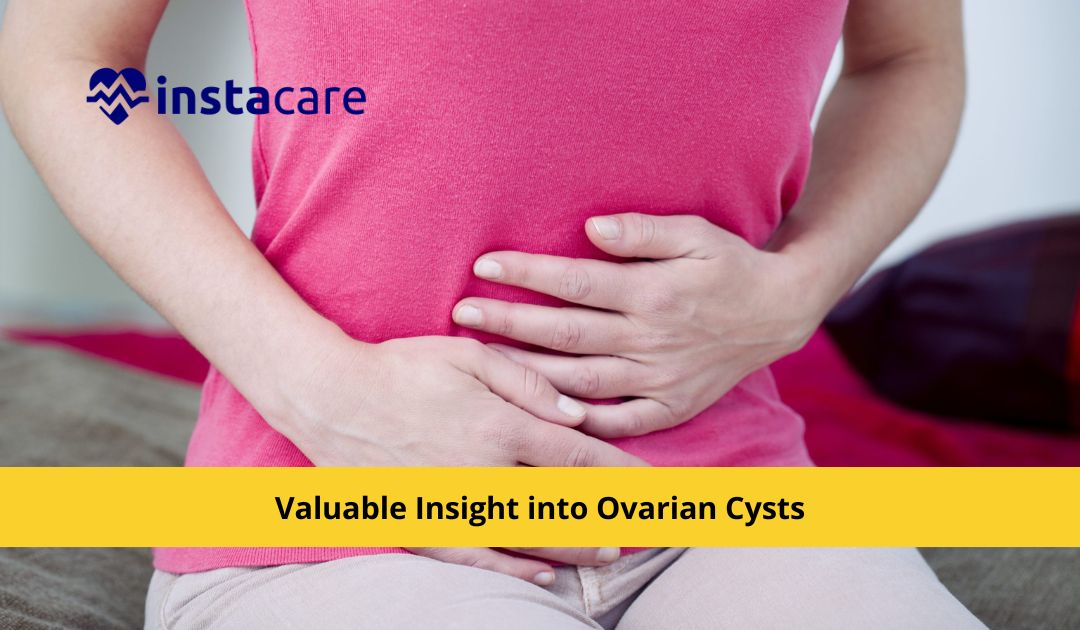In the world of women's health, there's something called ovarian cysts. that might seem small but can cause important problems that are often not noticed. These minuscule fluid-filled sacs possess the capacity to induce discernible problems within the body. Given their significance, it becomes imperative to shed light on their nature, and origins.
In addition, Indicative signs, and means of regulation. The purpose of this article is to facilitate your comprehension of the enigmatic scene of ovarian cysts in a simplified manner. Our objective is to unravel the complexity surrounding these entities. enabling women of varying ages to access valuable information. Through this endeavor, you will develop a more comprehensive understanding of the intricacies of ovarian cysts. Also, their profound implications for women's well-being.
Let's
Understand Ovarian Cysts
In the female reproductive system, ovaries develop small, fluid-filled sacs called ovarian cysts. While most cysts are harmless and often resolve on their own. Likewise, others can lead to discomfort and potential complications. They come in various types, with the most common being functional cysts, which typically form during the menstrual cycle
The Dance of Hormones
It is critical to comprehend how hormones affect ovarian cysts. A follicle in the ovary nurtures an egg and secretes hormones during the menstrual cycle. Sometimes the follicle expands and develops into a cyst instead of rupturing as planned. Estrogen and progesterone are important hormones in this process. Usually functional, these cysts go away on their own after a few menstrual cycles.
View More: Maximum Delay In Periods If Not Pregnant 8 Reasons
Symptoms And Signs
Detecting ovarian cysts can be a challenge, as they might not always display noticeable symptoms. However, certain signs should prompt women to seek medical attention:
- Pain: Persistent pain or discomfort in the lower abdomen, sometimes accompanied by bloating. That could indicate the presence of a cyst.
- Irregular
Menstrual Cycles: Changes in menstrual patterns, such as
irregular or heavy periods. That can sometimes be attributed to ovarian
cysts.
- Pelvic
Pain
During Intercourse: Pain during or after sexual intercourse might be a
sign of a cyst affecting the pelvic region.
- Urinary and Bowel Issues: Pressure on the bladder and bowel due to an ovarian cyst could lead to increased urgency, constipation, or difficulty emptying the bladder.
Diagnosis and Evaluation
If symptoms persist, it's crucial to consult a healthcare professional for a proper diagnosis. Doctors employ various methods to determine the presence and nature of ovarian cysts:
- Ultrasound: A
non-invasive ultrasound scan provides clear images of the ovaries. Hence,
aiding in the identification of cysts and their characteristics.
- MRI: In some
cases, an MRI might be recommended to gain more detailed insights into the
cyst's composition and location.
- Blood Tests: Hormone levels can be evaluated through blood tests, assisting doctors in understanding the underlying. hormonal balance and potential causes of cyst formation.
Management and Treatment
The management of ovarian cysts depends on several factors, including the type of cyst, its size, and the symptoms it causes. Here are some approaches that healthcare providers might consider:
- Watchful
Waiting:
Many cysts, especially functional ones, resolve on their own without
medical intervention. Regular monitoring and follow-ups can help ensure
the cyst is shrinking or disappearing.
- Pain
Management: Over-the-counter pain relievers can
alleviate discomfort caused by ovarian cysts. Your doctor might recommend
the appropriate medication based on your condition.
- Hormonal
Birth Control: For recurrent cysts, hormonal birth control
methods like pills, patches, or intrauterine devices (IUDs)
- Surgery: In cases of larger
cysts or those causing severe symptoms, surgical intervention might be
necessary. This could involve laparoscopy to remove or drain the cyst
while preserving the ovary.
Prevention and Self-Care
While not all ovarian cysts can be prevented, some lifestyle adjustments can promote overall reproductive health and potentially reduce the risk of cyst formation:
- Healthy
Diet:
A balanced diet rich in fruits, vegetables, whole grains, and lean
proteins can contribute to hormonal balance and overall well-being.
- Regular
Exercise:
Engaging in regular physical activity supports hormonal regulation and can
help maintain a healthy weight, reducing the risk of hormonal imbalances
that might lead to cyst formation.
- Stress Management: Chronic stress can disrupt hormone levels. Practicing relaxation techniques like yoga, meditation, and deep breathing can contribute to a healthier hormonal environment.
Summing Up!
Ovarian cysts, though often
unnoticed, can significantly impact a woman's life. By understanding their origins,
symptoms, and management options, women can make informed decisions about their
reproductive health.
Regular check-ups, open communication with healthcare providers, and adopting a holistic approach to well-being can empower women to navigate the intricacies of ovarian cysts with confidence and grace. Remember, your body's whispers are valuable; paying attention can lead to a lifetime of well-being.
Please book an appointment with the best Gynecologist in Lahore, Karachi, Islamabad, and all major cities of Pakistan through InstaCare,
or call our helpline at 03171777509 to find the verified doctor for your
disease.


